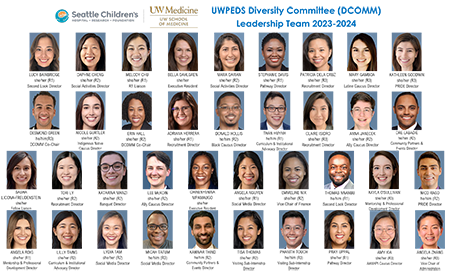Justice, Equity, Diversity, Inclusion (JEDI) and Antiracism in the Pediatric Residency Program
Residency Program Statement on Diversity and Antiracism
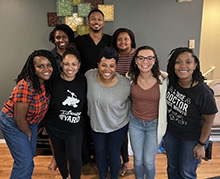 Systemic racism is a crisis that impacts our patients and community every day. As pediatricians, it is our responsibility to uphold the values of justice, inclusion, and equity. Our pediatric residency at the University of Washington (UW)/Seattle Children’s Hospital (SCH) is committed to fostering an environment of inclusion that values underrepresented minorities in medicine (URMs), including members of our community who identify as Black, Indigenous, and People of Color (BIPOC) and lesbian, gay, bisexual, transgender, gender diverse, intersex, queer, asexual, questioning and allies (LGBTQIA+).
Systemic racism is a crisis that impacts our patients and community every day. As pediatricians, it is our responsibility to uphold the values of justice, inclusion, and equity. Our pediatric residency at the University of Washington (UW)/Seattle Children’s Hospital (SCH) is committed to fostering an environment of inclusion that values underrepresented minorities in medicine (URMs), including members of our community who identify as Black, Indigenous, and People of Color (BIPOC) and lesbian, gay, bisexual, transgender, gender diverse, intersex, queer, asexual, questioning and allies (LGBTQIA+).
What started in 2003 as specific efforts in recruitment and retention of URMs to our program and hospital has grown into an intentional curriculum and environment surrounding inclusion and health equity. Advancing anti-racism is core to our mission and to our duty as child advocates. Our residency program and hospital have several programs to support these efforts to promote health justice for our patients and their families, our trainees, staff and faculty.
Residency Diversity Committee (DComm)
The Diversity Committee (DComm) of the University of Washington/Seattle Children’s Pediatric Residency Program is a resident-led and faculty-mentored team that is committed to championing justice, equity, diversity, inclusion (JEDI), and antiracism. (Read more about the leadership team [PDF].) We carry out these goals through recruitment activities, community building, mentorship, advocacy, education, and outreach. Additionally, we build protected spaces for minoritized residents as they undergo training as physicians. In doing so, we hope to build inclusivity while celebrating people’s intersectional identities. These include race, ethnicity, cultural backgrounds, national origin, language, gender identity, sexuality, socio-economic status, disability, religion, history of immigration, and other identities.
DComm is open to all members of the UW Pediatrics residency program. We work in parallel and in conjunction with our UW Department of Pediatrics Faculty JEDI Committee.
We carry out our goals through recruitment and retention activities, planning of a funded diversity sub-internship, community and mentorship events, protected safe spaces for minoritized groups and race-based caucusing, and advocacy efforts in our local institutions and communities. Some of our projects include:
- Active participation in the recruitment of a diverse class of talented and unique individuals
- Providing safe spaces to process sensitive resident experiences related to diversity, equity and inclusion
- Mentorship opporutnies and social events to build community between trainees and faculty, in partnership with the Faculty Justice, Equity, Diversity and Inclusion (JEDI) Committee
- Active leadership within Network of Underrepresented Residents and Fellows (NURF), including Dr. Gabriel Mendoza (Peds Allergy/Immunology Fellow, President) and Dr. Eric Robles (PGY-2, Secretary)
- Collaboration with Graduate Medical Education at Seattle Children’s on projects and issues related to diversity and inclusion, such as an antiracism action plan and microaggression reporting system
- Partnership with medical students on service and advocacy projects in the greater Seattle area
- Support of pathway programs for URM students interested in health science careers
INCLUDE (Inclusion, Cultural Humility, Diversity and Equity) Curriculum
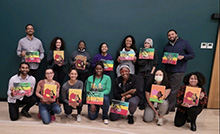 Implemented in 2017, our INCLUDE longitudinal curriculum covers approximately 25-30 hours of material each year, including skill building, didactics, and small group discussions. These sessions include case conferences, book clubs, journal clubs, and humanism sessions. During intern year, there is dedicated time for EDI training, including sessions on cultural humility, the historical context of racism in medicine, and addressing microaggressions. Additionally, didactics are held throughout the year on issues related to health care equity, such as trauma-informed care, LGBTIQ+ health, religion in medicine, immigration law, and other topics.
Implemented in 2017, our INCLUDE longitudinal curriculum covers approximately 25-30 hours of material each year, including skill building, didactics, and small group discussions. These sessions include case conferences, book clubs, journal clubs, and humanism sessions. During intern year, there is dedicated time for EDI training, including sessions on cultural humility, the historical context of racism in medicine, and addressing microaggressions. Additionally, didactics are held throughout the year on issues related to health care equity, such as trauma-informed care, LGBTIQ+ health, religion in medicine, immigration law, and other topics.
Health Equity Rounds
Developed by a group of current residents in 2019, Seattle Health Equity Rounds (HER) is a series of interdisciplinary case-based discussions at Seattle Children’s Hospital that explores issues of equity, bias, and racism that play out in medical settings today. As resident physicians, we have partnered with nurses, social workers, and the larger healthcare workforce at Seattle Children's to lead and facilitate conferences intended to open dialogue across disciplines. Participants discuss how race and equity affect the care of our patients and the way that we work with one another. We hope these conferences and subsequent dialogue lead to important policy and behavioral change in our workforce that will advance equity for our patients, their families, and each other.
HER has four broad goals:
- To understand and learn concepts and language used in health equity, such as implicit bias and structural racism
- To identify implicit bias and structural racism in clinical scenarios
- To describe and understand the historical context and present-day role of structural racism in the community and at our own institution
- To take time to reflect on bias at our institution, and to develop strategies to combat structural racism at the institutional level and across disciplines
Our HER conferences reach between 200-350 hospital workforce members each session. Past topics have included reviewing bias towards Indigenous families and the history of Indigenous family separation; racial bias towards families with parental substance use and disproportionate calls to Child Protective Services; racial bias in calls for security and policing in the hospital; and inequitable care for families who speak a primary language other than English.
Follow us on Twitter (@SeattleHER) and access our Seattle Health Equity Rounds Glossary to learn more.
Empowered Voices
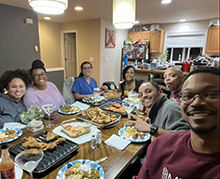 Our residents use their voices and positions as medical professionals to improve the health and well-being of our patients and communities of color. Some examples of ways our residents are currently involved in advocacy include:
Our residents use their voices and positions as medical professionals to improve the health and well-being of our patients and communities of color. Some examples of ways our residents are currently involved in advocacy include:
- AAP Representatives work directly with the Washington Chapter of the AAP to lead advocacy efforts within our residency program, and serve as experts on state legislative issues related to child health.
- Over the past few years, residents collectively wrote an Anti-Racism Call to Action statement to hospital leadership that included resident experiences and concrete action steps to aid in improving the hospital environment for our minority patients, trainees, staff, and faculty.
- Residents helped to organize a university-wide silent demonstration in conjunction with the UW Network of Underrepresented Residents and Fellows.
- Trainees participated in the Seattle Doctors for Justice March, which drew more than 10,000 healthcare workers to downtown Seattle in June 2020.
- Publication of an op-ed addressing the daily effects of systemic racism on child health.
Health Equity Track
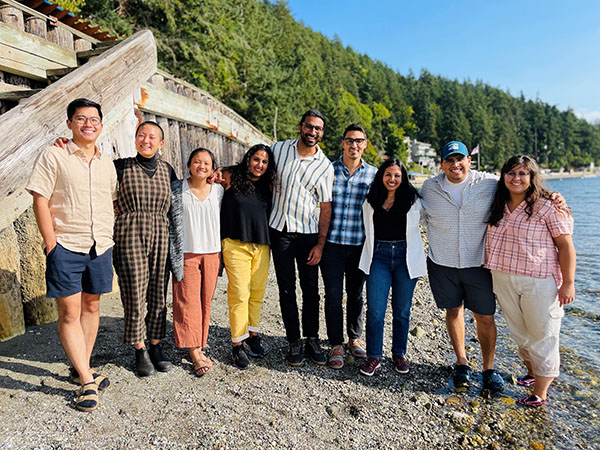 While all residents participate in the EDI curriculum and advocacy opportunities, we matched our inaugural class for the Health Equity Track in 2020. The mission of the health equity track is to train a diverse group of pediatric residents to advance health equity for children and adolescents through collaborative clinical care, community partnership, advocacy, and education. Residents in this track have dedicated months throughout their residency focused on growing skills in advocacy, leadership, and communication. HET residents learn to recognize structural roots of health inequity and strategize ways to mobilize resources and interventions that will advance health equity for our children, adolescents, and families.
While all residents participate in the EDI curriculum and advocacy opportunities, we matched our inaugural class for the Health Equity Track in 2020. The mission of the health equity track is to train a diverse group of pediatric residents to advance health equity for children and adolescents through collaborative clinical care, community partnership, advocacy, and education. Residents in this track have dedicated months throughout their residency focused on growing skills in advocacy, leadership, and communication. HET residents learn to recognize structural roots of health inequity and strategize ways to mobilize resources and interventions that will advance health equity for our children, adolescents, and families.
Funded Visiting Electives for Students Underrepresented in Medicine
Since 2005, the University of Washington/Seattle Children’s Hospital has offered a pediatric-specific funded visiting program for students who identify as underrepresented in medicine. This includes students who identify as African American/Black, Alaska Native, American Indian, Hispanic/Latinx, Native Hawaiian/other Pacific Islanders, and Southeast Asian, particularly sub-groups with histories of displacement and resulting diasporas. We also acknowledge that students may identify as belonging to an underrepresented minoritized group not listed here, which are discussed and reviewed on a case-by-case basis. Funding includes up to $2,500 for reimbursement of travel, housing, meals, and application fees.
Students will spend four weeks either on one of the ward teams at Seattle Children's Hospital as an acting intern or as an elective student caring for patients in the clinic and on the wards. Students completing an acting internship will do three weeks of day shifts and one week of night shifts.
Visiting students will be paired with a resident and faculty mentor based on their stated interests and will interact with residents and faculty who are part of our Residency Diversity Committee. In addition, applicants chosen for the program are guaranteed an interview for our residency in Pediatrics at the UW.
Since the initiation of this program, several of our students have matched into our program, and many still work in the region our system serves. If interested, learn more about how to apply.
Additional Partnerships
- Seattle Children’s Center for Diversity and Health Equity
- Department of Pediatrics Justice, Equity, Diversity, and Inclusion (JEDI) Committee
- Jason Deen, Assistant Professor of Pediatrics in the Division of Cardiology, serves as Associate Vice Chair for Equity, Diversity, and Inclusion in the Department of Pediatrics
- UW Network of Underrepresented Residents and Fellows (NURF). Instagram @UW_NURF
- UW Center for Health Equity, Diversity, and Inclusion
